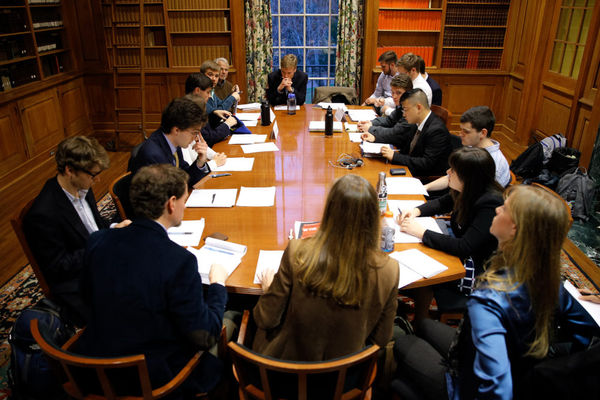Normally, a Wall Street Journal cameo is a good thing for a university. However, last year’s article by Mary Eberstadt, titled “You Can’t Cancel Me, I Quit,” came on the heels of a series of controversial events under the Tocqueville Center and was not complimentary toward Furman in the slightest.
Last year was a troubling time for the Tocqueville Center, a political thought community on campus that is “designed to help students and faculty to engage seriously with the most powerful arguments behind diverse and competing religious, political and ethical points of view,” according to its website.
French aristocrat Alexis de Tocqueville and his conception of a ‘modern democratic soul’ inspired former professors Dr. Ty Tessitore and Drs. Jenna and Benjamin Storey to create The Tocqueville Center for the Study of Democracy and Society. Tocqueville wrote “Democracy in America,” a critique and commentary of the early American democracy he encountered in his travels to America, and warned of the various potential pitfalls of this form of government.
Unfortunately, though, last year’s guest list of predominantly right-wing speakers reflected an underlying personal bias rather than a Tocquevillian approach to open political discourse.
Last year, Professor Aaron Zubia of the Political Science Department wielded the group as a vehicle, using it to drive his political agenda rather than further the mission of Tocqueville. Tensions raised throughout the year as speakers seemed to trend conservative, culminating in a silent protest against CLP “Dostoevsky on Conscience and the Revolutionary Spirit: The Case of Demons” by speaker Scott Yenor for his past comments against various groups.
Two months after, scheduled CLP speaker Mary Eberstadt published a response to the protest in the Wall Street Journal, in which she explained how the protest led her to cancel her visit.
Criticizing the protest, the op-ed included facts that were twisted in detail or even completely false. However, it began the needed dialogue to correct Tocqueville at the time as students were awakened to the extreme and singularly minded rhetoric of some of these speakers.
The group had been weaponized under Zubia's leadership. Last year, Paladin Opinions contributor Paige Lau wrote, “insofar as (the Tocqueville Center) continuously invites and encourages intellectual irresponsibility and equally irresponsible bigotry, it does far more harm than it does good for the Furman community.”
Both students and professors rallied to save the Tocqueville Center, some without realizing it. With the silent protest against Yenor drawing outside attention to the center, a call to accountability was created.
While harm was done, both to Tocqueville and Furman's reputation, a new page has since been turned. The combination of new leadership under Professor Brent Nelsen of the Political Science department and a return to valuing the study of Tocqueville rather than enforcing a political agenda promises a brighter future for the group.
The first several speakers centered on Tocqueville in America, a return to the basics. Rather than focusing on a certain topic of modern controversy, the talks have focused on Tocqueville's life and observations on democracy. While there are modern applications of his observations, they are that of Tocqueville’s views on what is required to preserve democracy rather than partisan issues.
The change in leadership will also help the Tocqueville Center reach its goal of hearing a variety of perspectives and having conversations with those who we disagree with. This is important as the dialogue that had been shut out last year is once again reopened, allowing for the society to pursue its Tocquevillian objective of engaging with diverse points of view.
Lau wrote, “the question of what Furman ought to look like demands we interrogate institutions, such as the Tocqueville Program.” While I find the phrasing strong, I must agree there is value in questioning institutions and bringing them back to the missions which they first promised us as a student body.
The intellectual community of Furman, not just the Tocqueville Center, must recognize the value of conflicting opinions from all sides of the political spectrum, even those with checkered pasts. And in light of the moderation of the Tocqueville Center, I must applaud Furman in its self-correction.
We may not agree with every idea we are presented with in our campus organizations — in fact, it is important to welcome debates with those we disagree with. But, as we have learned as a community, we must stay watchful of weaponized institutions that have strayed from their mission and hold them responsible for their duties in our community.
